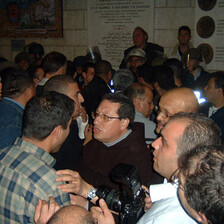Today, I went into Bethlehem; I interviewed the Parish Priest, Amjad Sabbara, who was inside the Church compound for 40 days. I think to myself, why 40 days? What an interesting number: Jesus fasted for 40 days, the Israelis wondered through the wilderness for 40 years. Didn’t something else happen for 40 days? I wonder.
The priest jokily laughed when referring to fasting and praying for the 40 days, “We have been trained to do that!” I asked him if this experience brought him closer to God and he said a most definite, “Yes.” with a gleam in his eyes. He was not held hostage, like the mainstream media tells us, he was there to protect his church and to help save lives. It is his “home” he said. He felt that “without their presence there would have been a massacre inside of the church, he is glad that only 7 people died”, during the incursion.
Local Palestinians were greeting him, asking questions in Arabic and were glad to see that he was in good spirits during my interview that was conducted inside of the inner courtyard. We were standing next to two trees, stripped bare of all leaves that were used to make “weed soup”. This was as far as anyone could venture outside without being shot at from the crane that was holding a box full of Israeli snipers that could see into most of the courtyard. I glanced at the statue of Mary who sits proudly on the roof of the church; her neck bore a black stain from a bullet that hit her. Will this stain last or will the rain wash it away? I cannot help but think that the stain resembles the stain that in inside of the hearts of the Palestinian people who have had to endure isolation for the last 40 days.
I interviewed families that lived in the homes next to the church. I saw one home where an elderly couple lived, Mary and George. George has been bedridden for 7 years and Mary takes care of him. They were kept inside of their room with little space to walk from the bed (a double) to the toilet. They shared the room with three rotating soldiers and the house with 35 other soldiers. They had to ask permission to use the toilet. They had to ask for food. For the first week, they used a pot that they kept under their bed to toilet in because the soldiers would not let them go anywhere. Mary was joyful in spirit, joking and laughing to her friends and myself during the interview. The soldiers gave her a packaged cake as they left when the siege was over.
“Oren was a good soldier, he made arrangements for my husband to go to the doctor, and when he left, he wanted to make sure that we didn’t need anything.” She laughed about how she couldn’t sleep because the soldiers that were in her room would take shifts and shoot all night from the window. Mary was lucky, funny how we say lucky under such circumstances isn’t it? The soldiers did not destroy anything in her home, they used the toilet as they should and feed them every day, “Tuna, Tuna, Tuna…that is what they gave us…sometimes we had bandourias (tomatoes) and they would make us tea and coffee.” However, they did break her brand new washing machine it cost her, “2,600 shekels”.
Rachel, her husband and two children lived in the other home. It was different for them than for Mary and George. This family had to stay in one room for forty days. This room did not have any light and after 8 days the electricity was shut off. This room didn’t have any windows. They also had to ask to use the toilet and they could not go anywhere else inside of their home. They shared their home with about 30 soldiers, 15 stayed on the level where they were and 15 would use the upstairs. The 15 soldiers using their level did not destroy any furniture just broke the windows to shoot their guns from.
When I went upstairs to look at the upper area, I had to put my shirt over my nose from the foul smell that emulated from inside of the room. I discovered that the 15 soldiers, who used the upper floor for their entertainment peed in coke bottles, broke the toilets and all of the furniture. I do not mean just broke the furniture, they demolished the furniture: cabinets were broken in half, beds were taken apart and the wood was used to burn, glass bits became part of the tile décor throughout the entire level. They wrote on the walls and made a “toilet” out of concrete blocks and a cardboard box. It was there for 40 days the soldiers used one room only for their desecration, one room to pile the trash and the others to shoot from the windows.
The Bethlehem Church Siege, and the city isolation is over now. The families can walk down the street and greet each other. They are happy to be outside.
Today was the first Sunday service inside the Church and many Bethlehemites shared in the service while looking around in awe at the bullet holes in the roof and pits in the mosaic walls. I wonder if anyone really listened to what the priest was saying.


